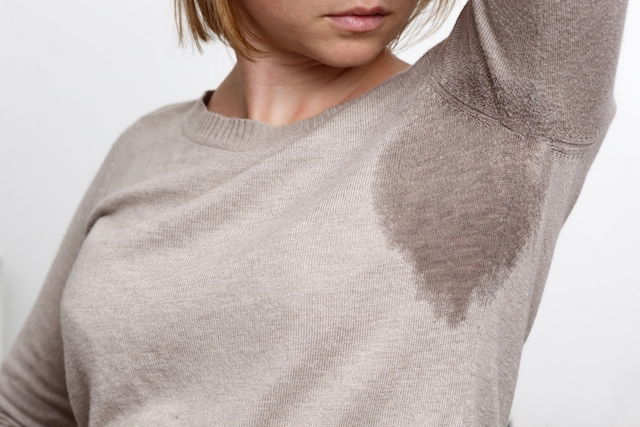Excessive sweating is usually caused by intense emotions, like stress, fear, pain or anxiety, but it can also be caused by medications, like antidepressants and antipsychotics. In more serious cases, it excessive sweating of a more severe health condition such as tuberculosis and even cancer.
Excessive sweating, also referred to has hyperhydrosis, can affect the palms of the hands, feet, armpits, face and neck, but it can occur in any part of the body. Depending on its cause, it may present with other symptoms such as hand tremors, fever and diarrhea.
If excessive sweating occurs frequently or occurs with other symptoms, it is important to consult a family doctor for assessment. Identifying the cause is essential for guiding the most appropriate treatment, which may involve measures to reduce anxiety, medication and even surgery.

What causes excessive sweating?
The main causes of excessive sweating are:
1. Intense emotions
Intense emotions like stress, fear or pain can stimulate the production of hormones that lead to excessive sweating.
Other symptoms can also occur with sweating, such as a racing heart, rapid breathing and dilated pupils.
What to do: Excessive sweating from intense emotions is not normally considered a problem and tends to decrease as the situation that caused it passes.
2. Anxiety
Excessive sweating is a relatively common finding when experiencing anxiety. In these cases, other symptoms may also appear, such as body tremors, a feeling of restlessness and difficulty concentrating or sleeping.
Also recommended: Anxiety Attack: What It Is, Symptoms & How to Stop It tuasaude.com/en/anxiety-attackWhat to do: When experiencing anxiety, it is important to look for ways to relax and distract yourself. Mild anxiety can often be managed with relaxation techniques or regular exercise, for example. More moderate or severe anxiety can be managed with psychotherapy and learning more targeted coping strategies. The doctor may prescribe anxiety medication for debilitating symptoms, as well as the use of some natural remedies for anxiety to complement treatment.
3. Use of medicines
The use of some medications, especially antidepressants, antipsychotics and insulin, can lead to excessive sweating. This effect can be even greater when medications are taken without a prescription or in doses above those that are recommended.
What to do: Excessive sweating usually improves after stopping the medication or adjusting the dose. It is important to report any side effects you may be experiencing to your prescriber so that the medication can be reassessed.
4. Alcohol withdrawal
Frequent and extreme alcohol intake can lead to withdrawal symptoms when the body starts to crave alcohol. One symptom of withdrawal is excessive sweating, which tends to occur within 24 hours of drinking. Other symptoms can also emerge, such as body tremors, anxiety, difficulty sleeping and a racing heart.
What to do: Excessive sweating tends to improve within a week of reducing or stopping alcohol consumption. In case of suspected dependence, it is important to seek help from a psychiatrist for adequate assessment and guidance.
5. Menopause
Excessive sweating caused by menopause usually occurs at night and is associated with feelings of intense heat. Menopause can also cause other typical symptoms such as mood changes and decreased sexual desire.
Also recommended: Menopause Symptoms: 12 Signs to Monitor & Treatment tuasaude.com/en/menopause-symptomsWhat to do: If menopause is suspected, it is important to consult a gynecologist for assessment and treatment as needed. Some symptoms can be managed with hormone replacement therapy and other natural remedies for menopause.
6. Hyperthyroidism
Hyperthyroidism is usually caused by abnormal thyroid functioning that leads to high levels of thyroid hormones. Symptoms of hyperthyroidism include excessive sweating, increased appetite, body tremors and diarrhea may. Learn more about the symptoms of hyperthyroidism and what can cause them.
What to do: It is important to consult an endocrinologist or general practitioner for assessment if you suspect hyperthyroidism. The doctor will determine the underlying cause and start treatment as necessary. Treatment may include the use of beta-blocker medications, iodine therapy or even a thyroidectomy.
Also recommended: Thyroid Tests: 9 Tests That Assess Thyroid Functioning tuasaude.com/en/thyroid-tests7. Tuberculosis
Excessive sweating caused by tuberculosis typically happens at night and may be associated with other symptoms such as fever, weight loss coughing, and phlegm with blood.
What to do: Excessive sweating tends to improve with tuberculosis treatment. However, it is important to consult an infectious disease specialist, pulmonologist or family doctor for assessment if you think you make have been exposed to tuberculosis. If confirmed, the doctor will initiate treatment, which typically involves the use of antibiotics.
8. Cancer
Although it is rare, some types of cancer, such as lymphoma, leukemia, or pheochromocytoma, can cause excessive sweating. In these cases, other symptoms such as fever and weight loss may also be present.
Also recommended: 12 Potential Signs of Cancer (& What To Do) tuasaude.com/en/cancer-symptomsWhat to do: If you suspect you may have cancer, it is important to consult your family doctor for a thorough evaluation. The doctor may order tests, like a CT scan or lymph node biopsy. Once the diagnosis is confirmed, treatment will depend on the type of cancer identified and can include chemotherapy, radiation therapy or surgery.






























